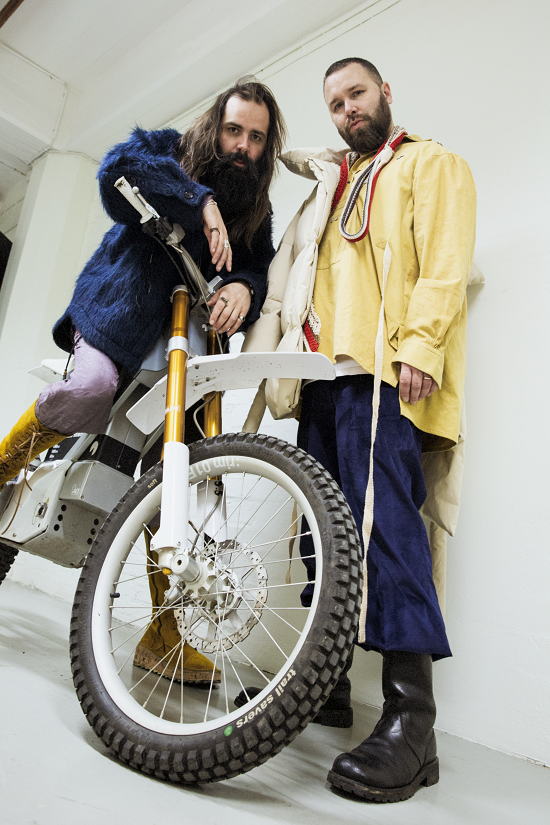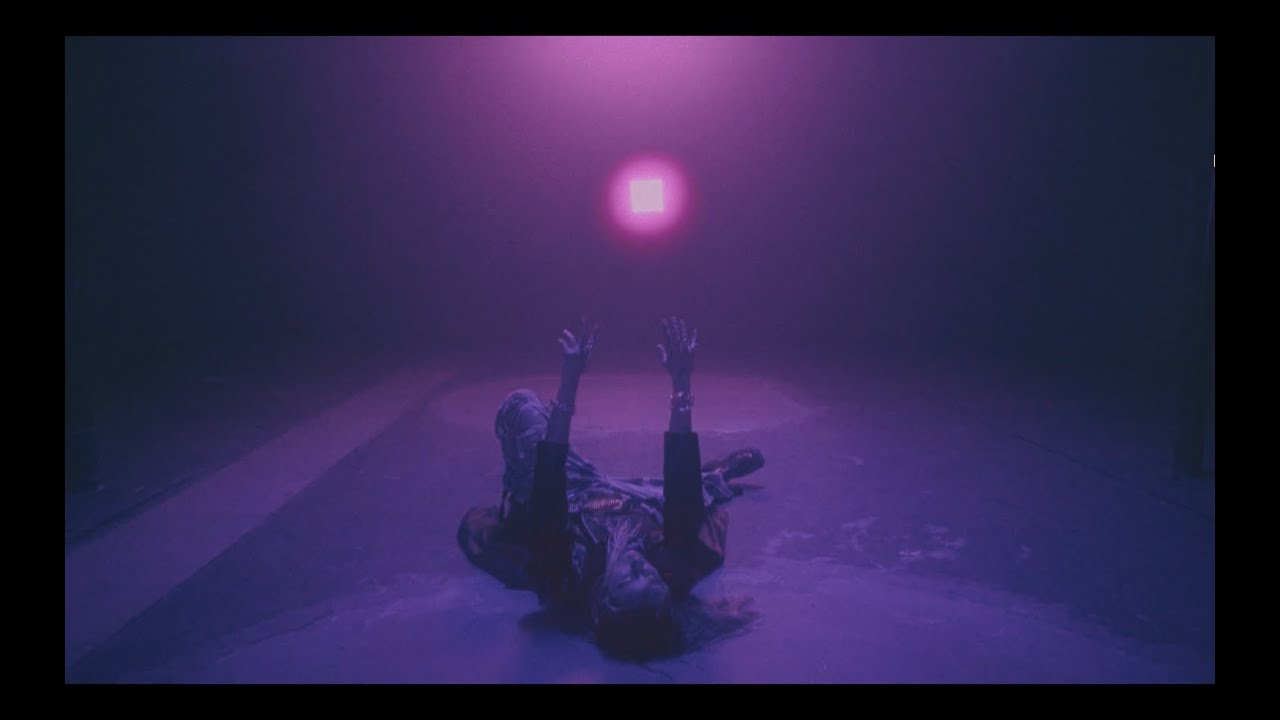Photo by Marcus Plamqvist
For the chance to win a copy of Aasthma’s debut album Arrival on vinyl, scroll to the end of this article
Aasthma is the new project from techno masterminds Pär Grindvik and Peder Mannerfelt. The Swedish duo have been friends for more than 15 years and have collaborated on numerous projects together in the past. Now, the pair have finally decided to collaborate on an album together, Arrival. It’s a bold step away from each of their musical pasts, and comes with one hell of a description; when asked what it sounds like, Grindvik is clear: “It’s Justin Bieber meeting up with Rotterdam Terror Corps to do an ABBA cover at the Grand Ole Opry.”
He’s not wrong. While it leans heavily into pop, the album also fuses trap, EDM, dancehall, R&B, ripped-up techno and more into a fierce new inclusive sound – something aided by the album’s collaborations. It features the likes of HTRK vocalist Jonnine Standish, Swedish rapper Silvana Imam, Shout Out Louds frontman Adam Olenius, Equiknoxx co-founder Gavsbourg, Casey MQ and Malcom Pardon.
Below you can find the first listen of their new single ‘Soulhack’, which features a guest appearance from Silvana Imam.
"Silvana Imam is a force of nature," the duo say. "A sweeping cultural movement. Working with Silvana is a dream come true for us, she is a legend in her own field unsurpassed in the way she combines classic hiphop sensibility with a powerful queer message. Soulhack represents a true meeting of our respective worlds, you’re invited to participate and make it a part of your own."
The album has its roots in Fever Ray’s last record Plunge too, which both Grindvik and Mannerfelt were enlisted for. They also helped to rework Ray’s entire back catalogue ahead of their 2018 tour. That project led the two to deconstruct the formulaic rules of techno into something that sounds like the future – one that’s inclusive, collaborative and free from restraint.
“We just want people to lose themselves in this record,” Mannerfelt says. “It’s the most inclusive record we’ve ever made, and it’s rips up what’s gone before,” Grindvik adds. Here, they tell tQ more about how the record came about, their influences – from Charli XCX to Kanye West – and why they’re only just getting started with Aasthma.
tQ: You describe the album as “Justin Bieber meeting up with Rotterdam Terror Corps to do an ABBA cover at the Grand Ole Opry.” As descriptions go, that’s pretty amazing…
Pär Grindvik: That was me, off the cuff. I came up with that [laughs].
Peder Mannerfelt: He’s very proud of that, can you tell?!
It’s a great description! How did the project come about?
PM: We’ve been working together for a long time behind the scenes. Pär had been co-producing all my solo music and we’ve been helping each other for years. I worked with Fever Ray on the last album and when the last tour came up, Karin [Dreijer] wanted to rework a bunch of the tracks from the first album and me and Pär ended up doing it together. It was great fun and not more-pop, but you know, more song-based things, and that’s when we started thinking: ‘Why don’t we do this more often?’
PG: The idea developed from there. We did a gig and slowly we started to feel like we had a specific sound for this. And then Aasthma was born.
PM: We still don’t really know what Aasthma is [laughs]. We’re still figuring that out!
PG: Coming up with a name was tough enough!
Where did that come from?
PG: It’s a secret [laughs].
PM: We were just bouncing around names and we wanted something that felt stupid and far out. Neither of us has asthma, but I guess like adding the double ‘a’ just made it a bit more stupid.
PG: We did an interview quite recently and we went into the room of this Swedish icon, a radio legend. We had an interview with him, and he had something in this room, which is where the name came from. I’m not going to say what it is! It felt like he put this thing in the room for us to see it. He was flaunting it.
PM: Every band name is a bit stupid. The Beatles is a really stupid name and that turned out okay!
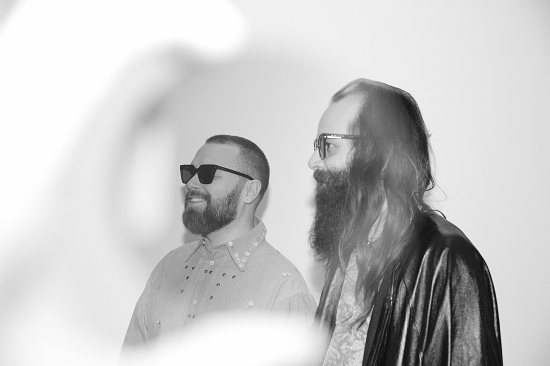
Photo by Marcus Plamqvist
Compared to your recent individual work, this album is a lot more pop based. Why did you decide to go down that route?
PM: One of our main goals was to reach [an audience] beyond what each of us normally does. We thought if we’re going to do a project together, let’s go beyond our comfort zone. We’ve done lots of stuff and played all the coolest things: we’ve ticked all the boxes in our lives. Now, we were like, ‘What haven’t we done?’ We haven’t done pop, so we thought, ‘Let’s go for that!’
PG: Pop, but something that is also a mix-match of everything.
PM: I think we both came to the point a few years where we stopped being snobs when [it came to pop] music too.
PG: Yeah, so like gatekeeping. And especially now because you can see that if you do something really secret and nerdy, you do a white label, you just push it out like limited editions, no one will notice, no one will care and no one will press play. It doesn’t work in the way that it used to. And for who are you being a snob? Is it just for yourself?
What did each of you bring to a project like this?
PG: I think the main thing is not so much about like music styles, it’s more about challenging each other. When Peder writes something, just because we know each other so well, I can really hear the sweet spot when it arrives – and I can tell him ‘you need to work on this’ without it [being an issue]. We can lift [the music] another one or two steps.
PM: We push each other in a positive way; we know each other’s strengths.
PG: I can tell you straight out like when you’re not there yet and most of the time like what we end up doing is like making things more-simple. We always start off with too much and then we take off.
P<: Yeah, but we can always take out more too. We should be taking out more [laughs]…it’s the thing we find hardest to do!
PG: I think it’s something we’ve tried really hard with on this album. We are into deconstructing right now… we’ve been listening to a lot of Kanye West’s Yeezus. When we analyse it, if you listen to his previous album before that, there’s so much going on. And that album he had other people telling him to like take things out. So you can feel the songs are still there but it’s just super minimal.
PM: And stuff like Charli XCX too, like more modern stuff that’s just kind of uncompromising and just bang on and unapologetic. We’ve learned a lot from that.
There are so many musical touchstones on this album…
PG: I mean yes, it’s really diverse – it’s everything. It was new stuff and contemporary pop, plus hyper pop, but there was also a lot of 2000s R&B and hip hop as well. We mixed things that we thought might not be the most obvious mix. The aim was always to make music that doesn’t sound like anything else.
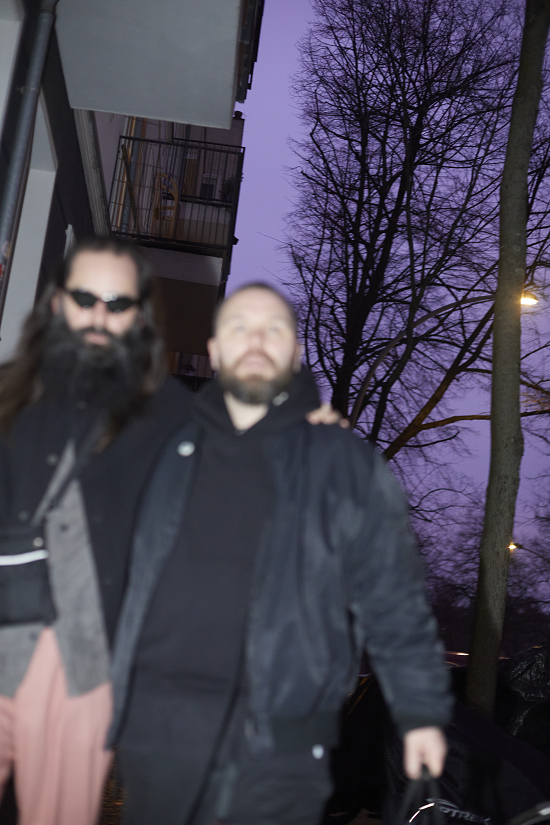
Photo by Fredrik Altinell
The diversity of the genres on the album really helps the album to reach lots of different audiences too…
PM: That was the goal for it, to kind of reach out and beyond from our little bubble.
PG: We also wanted to show where [our] inspiration comes from and not like try to hide it in some kind of coolness. It’s more ‘This is what we’ve been listening to and get inspired by and we want to be.’ We notice coming from a really nerdy background that not everyone is comfortable saying ‘Ah we love this,’ but we wanted to [change that].
How long did it take you to bring the album together?
PM: We were sketching songs before lockdown.
PG: Yeah, but we didn’t have a plan to do an album initially. The label actually asked for it. We did a remix for them, Catnap and Modeselektor, and they asked us if we wanted to do it. We said we want to do more pop again – things that are electronic but pop – and they said: ‘Okay we want to do an album.’ I think we both were a little bit against it in the beginning. I was thinking it’s such a big process and we were kind of done with the album format too.
PM: We had decided to leave the album format for a bit and focus on just trying to make tracks, maybe not for ourselves, maybe to produce other people’s stuff. We had to brew on it for a bit, but then we actually thought ‘Okay maybe this is a good opportunity to work with other people.’ That’s where we started off really, asking people about sketching songs together.
It’s a hugely collaborative album…
PM: It felt like a great opportunity to reach out to loads of different artists.
PG: We talked about what kind of artists we’d like to hear on certain records. We spoke to songwriters and artists that we enjoy ourselves, ones we really look up to and who felt super fun to work with. All of them have a special place for us. I mean there were tonnes of tracks that didn’t end up on the album, and these might come later on.
PM: Yeah I think we had like 27 songs or something in the end!
Was it a challenge narrowing them all down?
PG: It was such a challenge to get it all together! We wanted to do something that you want to put on again and again, something where you’re not going to be jumping anything. We referenced so much different stuff and that’s why we ended up with an album that’s all over the place!
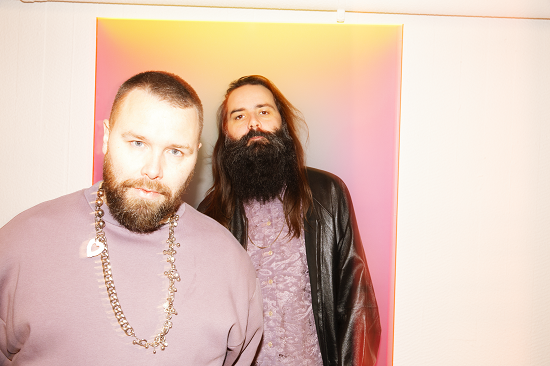
How did your producer, Johannes Berglund help with this?
PM: I worked with him before like most recently on the last Fever Ray album, mixing that. Pär and I are both competent enough to mix a record like this ourselves, but we felt it would be good for someone else to come in and let us take a back seat. He’s fairly honest and analyses things very fast and he’ll say: ‘Guys, what are these eight bars? Do we need them? No? Well let’s chuck it!’
PG: It was a great process and I think that we learned a lot. I think we’re definitely going to do it again.
PM: We can trust him. If he says it needs to be this way, we can sign off on that. He’s from the north of Sweden, so very decisive [laughs].
What have you learned from this project and how will it influence your work individual work do you think?
PG: I feel like now we are one step further ahead when it comes to production – not just sitting and listening to loops and becoming too involved with it. I don’t think it’s good for music when you start to really [mull] things over: you need to have like an in and out.
PM: At least we do. Not to be too precious about things – that’s also the biggest challenge. We’ve both been precious with stuff and sat tweaking at it for years. Then it doesn’t even materialise.
PG: There’s a lot of music where I’ve been spending a half year on like [editing] a techno track but I will not stop there [laughs]. It will continue to haunt me in my sleep. We’re trying to get better at leaving things!
What’s the main thing you want people to take away from this project?
PM: That’s interesting. That’s kind of the part I guess we haven’t really discussed ourselves like the reaction to it. We’ve been so focused of just trying to pull everything through because it’s been such a strange and weird and eclectic thing. It’s like our goal has been to try and reach out and find new audiences and people that we don’t know.
PG: Exactly and I think that part is where we still have a lot of work to do, because it’s still in our scene that people listen to it, and we would like to reach beyond that. I’m looking forward to having all this music out and seeing how people pick it up. We’re really having a lot of fun with it: we hope everyone else does too.
Aasthma’s debut album Arrival is released on September 15 via Monkeytown Records
To be in with a chance to win a vinyl copy of the album, email comps@thequietus.com with the subject header ‘Aasthma’, and an answer to the following question – which other Swedish pop maestros have also famously released an album called Arrival?

